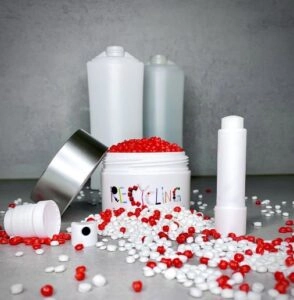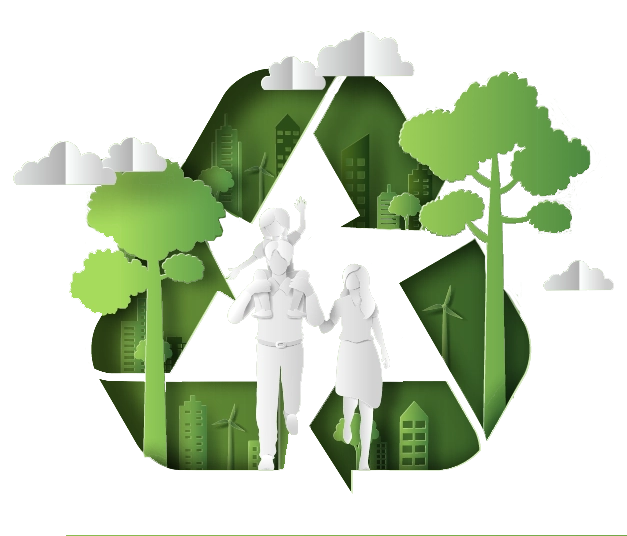organic plastics

Would you like to make your production processes more sustainable but with the quality you are used to?
We can offer you various high-quality polymer compounds for resource-saving and safe production for almost all areas that can be biodegradable depending on the desired product properties. A distinction is made between industrial and home compostability. In addition, there is the possibility of producing bio-based materials based on renewable raw materials, these are also referred to as BIO plastics. Furthermore, each of our offered bio-plastic granules can be easily integrated into existing processes. Depending on the requirement profile, we offer you a wide range of environmentally friendly solutions for your projects, individually tailored to your application.
Simply speak to our experts, we will be happy to advise you in detail which plastics are best suited to your production processes.

PCR rezyclate
PCR recyclates for the highest demands in the cosmetics industry Breitungen, September 2022 – The plastics distributor and compounder BIO PLASTICS & Recycling GmbH &

The „Blauer Engel“
Germany’s eco-label The „Blauer Engel“ is a so-called type I – environmental label based on the international standard DIN EN ISO 14024 „Environmental labels and

Organic Plastics
What is meant by bio-plastics? The term bioplastic describes both plastic on a biological basis and biodegradable plastics. How much organic is in organic plastics?
Please write to us using our contact form with your request. We will take care of your request immediately and your personal contact person will get in touch with you promptly.
Do you have anymore questions? Then you can also reach us by phone at: +49(0)36848 86898. We are happy to help!

You can also reach us by phone at: +49(0)36848 86898
Polylactide (PLA for short) is a synthetic polymer from the polyester family. They are used in the manufacture of plastics from recycled sources (e.g. lactic acid or corn starch). This makes PLA a biocompatible raw material.
PLA is characterized above all by its biodegradability and compostability and the plastic is also food-safe, making it ideal for the food packaging sector. The low moisture absorption makes storage easier and the high UV and flame resistance are practical properties for a wide range of applications. In general, PLA has good mechanical properties, such as high surface hardness, rigidity and high tensile strength, but only moderate impact strength.
PLA has moderate temperature and weather resistance. The dimensional stability is about 65 degrees. In short, PLA is an unsuitable raw material for applications and objects with high heat loads. Although PLA has biocompatibility, it is not itself biodegradable in household compost. However, it can be biodegraded in industrial composting plants.
In Europe, about 11 million tons of starch are obtained mainly from corn and wheat. These raw materials can be processed in their natural form, but it is also possible to modify them into mixtures. The pure starch can even be used as a filler for loose fill outside of food packaging applications.
Starch can be used as a filler for compounding to increase strength. The addition of starch improves the biodegradability of the material and increases the rate of degradation. The starch content in our compounds can be up to 70%. Here, thermoplastic starch is often mixed with water-repellent, biodegradable polymers.
Starch compounds consist of two phases: a continuous hydrophobic polymer phase and a dispersed hydrophilic starch phase. Together they form a waterproof bio-plastic mixture. Most flexible starch compounds contain biodegradable polyester as a mixing partner. Typical areas of application include the packaging sector (fresh storage bags for fruit and vegetables) or other food packaging. This bio-material is gradually replacing the well-known polyethylene.
Polyethylene (PE) is one of the most commonly used plastics in the world. We encounter this thermoplastic material every day and it accounts for more than a third of the world’s plastic consumption. Our bio-based polyethylene offers a sustainable alternative to fossil PE.
Unlike conventional polyethylene, the ethanol used to manufacture it is not petroleum-based but is made from sugar cane. By using this renewable raw material, 1 ton of green PE can save about 3 tons of CO² from the atmosphere compared to conventional polyethylene production. It thus actively contributes to the reduction of harmful greenhouse gases.
Nevertheless, green PE has the same properties as its fossil counterpart. Our product portfolio includes various HDPE, LDPE and LLDPE types, which are characterized by excellent property profiles and processability.
Bio-based polyethylene is processed, among other things, by blow moulding, injection molding and film extrusion. BIO-PE can completely replace fossil PE in every area of our lives. From film, packaging, bottles and canisters to simple injection molded parts, thermoformed containers, tubing, sporting goods and toys. The list of areas of application is long and can be expanded in the future thanks to constantly improving research and production processes.
All of the BIO-polyethylenes we produce are 100% recyclable in the PE recycling stream at the end of their useful life!
A product family of tailor-made compounds based on bio-PE. They are all based on the renewable raw material sugar cane and thus make a significant contribution to reducing the use of fossil resources. The use of bioplastics also significantly reduces the amount of conventional plastics on the market. In addition, the use of renewable raw materials helps to reduce harmful greenhouse gas emissions. Sugarcane absorbs and stores atmospheric CO² during growth. If this plant is then used to produce plastics, the absorbed CO² remains bound to the end product throughout its life cycle. BIO-PE compounds therefore have the same properties as the corresponding fossil materials such as PE or PP and can be processed in existing production facilities without any adjustments. In addition to film and tube types, the portfolio includes a large number of injection-mouldable bio-PE and PP compounds.
The stability of the connection enables long-lasting products. Probably the biggest advantage: The longevity of the materials not only makes the products made from them more sustainable, they are also very attractively priced. All products can be fully integrated into existing waste streams at the end of their useful life and are 100% recyclable!
With bio-PET, ethanol is obtained from sugar cane to produce these granules so that no fossil raw materials have to be used for the production of packaging materials.
Our granules can be processed and recycled just as easily as conventional plastics. PET scrap collection is already widespread, allowing for large-scale recycling and allowing larger volumes to be reintroduced into the economy for more sustainable production processes. They are safe, resource-saving and just as stable. That is why they are in no way inferior to conventional plastics. However, these granules are not biodegradable on their own. In combination with fossil PET, they can still be recycled.
Bio-PET granules can replace regular plastic granules in a variety of applications. A product made from these granules that everyone knows is the PET beverage bottle. Other areas of application are bottles, films and transparent packaging for food.
EVA is an abbreviation for ethylene vinyl acetate, a plastic made by combining ethylene and vinyl acetate. This elastic polymer can be used to make products with rubbery softness and flexibility. They also have good heat and aging resistance.
Depending on the type, the bio-based content ranges from 45% to 80% based on ISO 16620-2 and EN 16640 standards. Bio-based EVA can be used wherever fossil ethylene vinyl acetate copolymers are currently used. This is ideal for the shoe, rubber and toy industries looking to make their production more sustainable and innovative. It can be easily used and processed by existing production systems. At the end of its lifespan, Bio-EVA products can be recycled and reused in the same cycle as traditional EVA manufacturing.
Our products have similar usage and processing properties as fossil mass plastics (e.g. polyethylene), but are certified as biodegradable and compostable according to the European standard EN 13432. In addition to being certified as industrially compostable, our portfolio also includes granules that can be composted at home. Depending on the product, these materials are designed to biodegrade quickly under standardized conditions in industrial composting facilities or home garden compost. The granules can be completely converted into the three components carbon dioxide, water and biomass. In contrast to other bio-based granules, these granules are characterized by significantly higher degradation rates, especially at low temperatures. TPS are ready-to-use compounds. No further modifications are required to be able to process them in existing systems. The main areas of these materials are garbage bags, vegetable bags and foils.
Wood-Plastics-Composites (WPC) or Natural-Fiber-Compounds (NFC) can not only be made with wood, but also with other plant fiber additives such as e.g. Kenaf, jute or flax can be manufactured without changing the material properties and quality features. The products are still referred to as WPC, even if they do not contain any wood. In Central Europe, WPCs usually consist of 50% – 90% natural fibers and plastics such as polypropylene (PP) or the somewhat more common polyethylene (PE).
The ecological balance of WPC products, which are made with a large proportion of wood fibers and also with recycled plastics, is better than that of tropical woods or conventional plastics and on a par with native softwoods. Another great advantage of this material is that it can be freely shaped in 3 dimensions and is highly resistant to moisture. Compared to all-plastics, WPC offers greater rigidity and at the same time a lower coefficient of expansion with thermal changes.








